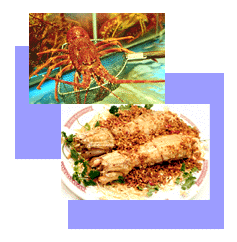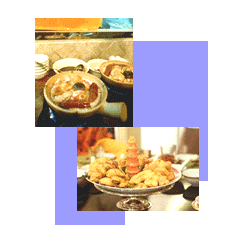
![]()
Cantonese cooking is one of the most popular style in Chinese Food. However, many restaurants also specialise in the cuisines of Chiu Chow, Hunan, Peking, Sichuan, Shanghai, Taiwan, Yunnan and the Hakka people.
Chinese wines
Chinese "wines" are distilled from rice, millet and other grains, as well as herbs and flowers, instead of from grapes. A wide variety of tonic wines are made by steeping various traditional health-giving ingredients such as ginseng or essence of snake in rice and other grain-based wines. Rice-based Siu Hing, "Yellow Wine", best served warm, tastes somewhat like medium-dry sherry. It goes well with all kinds of Chinese foods, especially during the cool season. Go Leung and Mao Tai, fiery, millet-based distillations with an alcoholic content of 70 per cent, are best sampled only after a hearty meal. Ng Ka Pay, reminiscent of Campari, is a sweet herbal wine believed to have medicinal qualities.
 Seasonal
specialities
Seasonal
specialities
Every Chinese regional cuisine has its seasonal specialities. In the autumn, restaurants offer steamed Shanghai freshwater hairy crabs. The female, treasured for its complexion-enhancing golden roe, arrives in September; the male in October. "Rice birds," tiny Java sparrows, are netted at rice-harvest time, roasted and eaten whole -- bones and all.
In the winter, body-warming game dishes are often served in double-boiled soups and casseroles. Deer, turtle and game birds are farm-bred in China while endangered species are protected by Hong Kong's customs regulations.
Hotpots, casseroles and "steam boats" are cool-season comforts that can be enjoyed year-round in Northern-style Chinese restaurants. A steam boat is an earthen pot of bubbling seasoned stock in which diners cook a variety of meat and vegetables.
During spring Lunar New Year festivities, many foods such as white turnip cake, have a special significance.
In the summertime, juicy "winter" melon is popular because it is light and absorbs the flavours of other foods. At banquets it is often served as soup, presented in an elaborately carved whole melon.
Special glutinous rice dumplings
are eaten during the Dragon Boat Festival (usually in early June). Mooncakes,
which are thought to have originated in 13th-Century China, are the favoured
food of the Mid-Autumn Festival, usually held in September. These round
cakes made from lard, sugar, spices and almonds are filled with lotus
or sesame seed paste and the salted yolks of duck eggs. Also popular are
rich flavoured cakes, or nin go, which symbolise success due to a play
on the word go, meaning "high". Lotus seeds in a sweet soup are offered
to young couples because their name, lin chi, is the same as the Chinese
for "every year a son."
Festive food